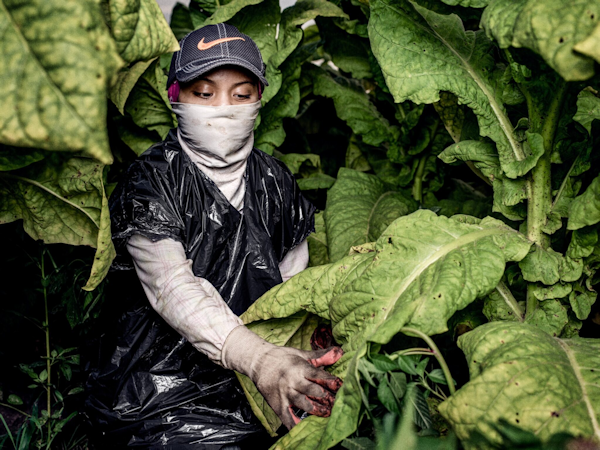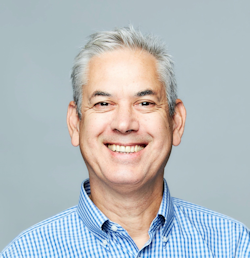SEJournal Online is the digital news magazine of the Society of Environmental Journalists. Learn more about SEJournal Online, including submission, subscription and advertising information.
 |
| One recent FERN story highlighted the plight of young agricultural laborers. Here, a teenage tobacco worker tries to protect herself against pesticides in the fields. Photo: Benedict Evans, Human Rights Watch Creative Commons (CC BY-NC-ND 3.0 US). |
Feature: Tilling the Storytelling Fields on the Food, Ag and Environment Beat
By Samuel Fromartz
I've had quite a run at the Food & Environment Reporting Network, more than a decade as editor-in-chief. But I recently decided to step down and bring in new blood so FERN can move ahead to the next stage of its evolution.
Looking back, what I'm most proud of is the sense that we created a "FERN story," one that looks in-depth at issues in food, agriculture and the environment with narratives that draw readers and listeners in.
In other words, we are first and foremost storytellers. We always ask how the piece would be received by someone with no background in the issue. Would they keep reading or listening?
Because that is central to our mission: amplifying stories beyond our core audience and influencing the discussion.
Journalism-studio approach finds bigger audience
We launched in 2011 in the midst of a media retrenchment that continues to this day. Many talented journalists we knew were being laid off or were underemployed and underpaid as freelancers.
The question we asked was whether we could funnel money to reporters to produce work in our subject area, but also serve as a bridge to get these stories published with much bigger outlets.
We had essentially created a "journalism studio,"
akin to shops in the entertainment industry that
engage writers, producers and directors, then
develop ideas and reach distribution deals.
Years later, we realized we had essentially created a "journalism studio," akin to shops in the entertainment industry that engage writers, producers and directors, then develop ideas and reach distribution deals with much bigger studios to find an audience.
We knew that as a small startup our skeletal editorial team would never compete in breaking news with larger outlets. But we also saw that, given the cutbacks of staff in the media, many stories in our subject area were being ignored or underreported.
I saw this with climate change, which for years largely focused on power plants, renewable energy, transportation and buildings and was hardly ever connected to agriculture — from methane-producing cows to nitrous oxide emissions from fertilizer.
We steadily reported on the issue and began to witness a shift in the conversation.
Nearly a decade on, we're seeing the Biden administration put billions of dollars into programs aimed at both cutting agricultural emissions and increasing carbon sequestration (which has led to other stories, questioning whether these programs will actually work).
The larger point — we went deep into little-recognized stories because they were important and could help us distinguish ourselves in the media marketplace.
A focus on accountability
 |
| Samuel Fromartz. |
We also knew that these stories, many of them investigations, were vital to bringing inequities in the food system to light.
The strategy of digging into significant, underreported issues kept us off the treadmill of daily news — a notable exception being FERN's Ag Insider, a daily food policy briefing aimed at a professional audience.
Many of the deeper issues we cover lend themselves to accountability journalism: the lack of protections for farmworkers in extreme heat; the way factory farms foul rural communities with livestock waste pollution; or the illnesses and deaths among meatpacking workers during the height of the COVID-19 pandemic (our tracking data and stories produced by former staff writer Leah Douglas were cited globally).
Our latest example, which appeared last month, is a data analysis showing that the food industry accounts for three-quarters of child labor violations in our economy.
Many FERN stories also would qualify as explanatory journalism — trying to raise awareness of biodiversity loss, for example, much of it related to agriculture’s footprint.
‘Good stories sell themselves’
The food, ag and environment beat is incredibly wide-ranging. It includes science reporting, business, health, culture and labor — and the best stories check numerous boxes.
But the main question we're always asking is whether the story is surprising and ambitious, breaks new ground and amounts to more than a curious factlet.
If you're going to get beyond the drumbeat
of daily news you need to entice editors with a
compelling story, one that changes the narrative
on an issue or significantly advances it.
Because if you're going to get beyond the drumbeat of daily news you need to entice editors with a compelling story, one that changes the narrative on an issue or significantly advances it. As an editor friend recently said, "Good stories sell themselves."
The trick for us is in identifying those stories, developing them and supporting writers who are in a position to report them. Along the way, our editorial team works intensely with writers to refine pitches — after all, we need to place the stories too. Once the story is placed and reported, we edit drafts in collaboration with our media partners.
For those of us who have spent decades in journalism, this is a somewhat contrarian approach.
I came up at a time when you closely guarded your work and sources and always tried to beat the competition. But with the decimated media landscape, scrappy outfits like FERN — and now much bigger media companies — have realized there is strength in working together.
At the outset, we had to fight to get our foot in the door of media companies. Now, they seek us out.
As we've grown up, our writers have also matured. Many have published books or second books.
I'm gratified to look back and see what we've done, who we've worked with and what we've become. And I'm excited to see what FERN’s next editor will do to build on that foundation.
Samuel Fromartz is a co-founder and editor-in-chief of the Food & Environment Reporting Network. He is an author and veteran journalist who focuses on the intersection of the environment, food and farming. He began his career at Reuters, working as a correspondent and editor. As a freelancer, his articles appeared in Fortune, Businessweek, The New York Times and The Washington Post, among other publications. He is the author of “Organic Inc.: Natural Foods and How They Grew” (Harcourt, 2006), about the evolution of the organic foods industry, and “In Search of the Perfect Loaf: A Home Baker’s Odyssey” (Viking, 2014), an award-winning memoir that explored bakers, grains and bread.
* From the weekly news magazine SEJournal Online, Vol. 8, No. 20. Content from each new issue of SEJournal Online is available to the public via the SEJournal Online main page. Subscribe to the e-newsletter here. And see past issues of the SEJournal archived here.










 Advertisement
Advertisement 



